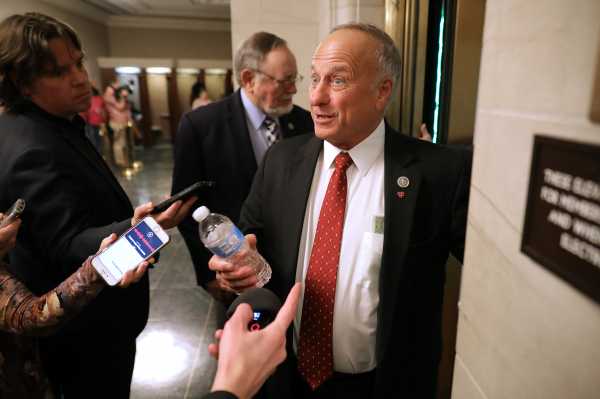
On Monday, Rep. Steve King (R-IA) was unceremoniously booted from his House committee assignments by members of the Republican Steering Committee, four days after racist comments King made to the New York Times — “White nationalist, white supremacist, Western civilization — how did that language become offensive?” — became publicly known.
King’s comments proved too much for his Republican colleagues. “If he doesn’t understand why ‘white supremacy’ is offensive, he should find another line of work,” said Senate Majority Leader Mitch McConnell. His sentiments were shared by conservatives more broadly.
But King’s comments to the New York Times were new only in that he specifically defended the words “white nationalist” and “white supremacist.” For more than two decades in public office both in Iowa and in the US House, King’s racism has been his most readily identifiable characteristic.
Join the Vox Video Lab
Go behind the scenes. Chat with creators. Support Vox video. Become a member of the Vox Video Lab on YouTube today. (Heads up: You might be asked to sign in to Google first.)
Like when he directly compared the existence of the Congressional Black Caucus to having an abortion. Or when he endorsed a white nationalist in Toronto’s mayoral election. Or when he’s taken foreign trips to meet with far-right groups founded by Nazis. Or when he’s espoused his belief that “white nationalist” wasn’t a “derogatory term” until just a few years ago. Or any of a myriad number of examples that are so prevalent and widely known that even the conservative outlets that condemned King for his remarks to the New York Times listed those examples, too.
And yet in 2015, even after King’s comments about DREAMer immigrant kids having “calves the size of cantaloupes” and his decision to bring a far-right Dutch politician who believes that the Quran is “worse than Mein Kampf” to the Capitol, conservatives didn’t feel the need to distance themselves. The Federalist lauded his birthright citizenship proposal; National Review was still describing him as a “conservative firebrand” and “outspoken,” words one might use to describe, say, Sen. Ted Cruz (R-TX), not someone who routinely voices praise for bafflingly racist novels.
There’s a larger problem, one far bigger than King, or conservatism. The way we talk about race and racism in the United States is wrong. In short, we think of “racist” as an insult, rather than as an adjective. And we have narrowed the concept of racism down to an almost ludicrous extent, in effect often excusing real racism — like that espoused by people like King — and its impact on nonwhite Americans because it is not literally wearing a hood or setting a cross alight on a lawn.
Steve King lost votes — and political power
First and foremost, it’s important to note that in brass-tacks political terms, King’s pre-2019 political fortunes rested on his perceived position as a potential political kingmaker for up-and-coming conservatives — including presidential candidates — and as a reliable GOP vote in Congress representing a heavily conservative district in a very important state.
Thus, Republicans largely treated his many, many, many racist statements as “white noise,” while privately believing, as several conservative pundits told me last year, that he’s a “joke” and “a stupid asshole.”
But then came the 2018 midterm elections, and while King beat his Democratic opponent, J.D. Scholten, he won by just 2,500 votes and 3 percentage points in a district that was widely viewed as a safe Republican seat (and that King had won by more than 22 points every time he ran except for in 2012). The election was so close in part because of his rhetoric. King also lost major financial backers just a week before Election Day, when news broke that he had met with a far-right Austrian political group in Europe.
The race changed perceptions of King — now less a political kingmaker, more a political liability who has never introduced a bill that became a law and had trouble hanging on to a safe Trump seat. And with a Republican primary challenger with experience and none of King’s racial baggage waiting in the wings for 2020, the decision to cut ties with King has been made far easier.
Consider that last year, I asked then-House Speaker Paul Ryan’s office if he had any comment on King’s endorsement of white nationalist Faith Goldy for mayor of Toronto. His spokesperson responded: “That’s a political question for our political team.” Not anymore, apparently.
Then there’s the matter of King’s biggest political focus: immigration restrictionism. Keeping immigration hawks on board with the GOP once meant catering to him. But with Donald Trump in the White House — a president who has made immigration his centerpiece issue as well — King’s immigration stance is less distinct. (During a White House visit in early 2017, King even told Trump that he had “market-tested” his immigration policy.) A Republican looking to bolster their immigration-hawk bona fides can skip King and just voice support for Trump.
It’s also worth noting that for many conservatives, the issue of race and racism is a particularly sensitive one for fairly obvious reasons: namely, the lengthy history of racism in the conservative movement. Many on the right have long been hypersensitive to accusations of racism, often reacting by circling the wagons around those within their camp whom they believe have been unfairly accused of a potentially fatal allegation.
In 2017, Peter Beinart wrote on these fears in the Atlantic:
So when King tweeted in March 2017, “We can’t restore our civilization with somebody else’s babies” — a comment that came under fire from critics — conservative pundit Ben Shapiro argued that criticism of that racist comment showed the media’s “deep desire to paint Republicans as racists rather than defenders of Western cultural superiority.” He said that there were two ways of interpreting the statement — one as racist, the other as “badly phrased but not racist” — and that King’s other comments regarding the tweet showed that the latter was true.
That article now includes an update added last week, with Shapiro writing that “this article gave far too generous an interpretation of King’s words” and that the “first interpretation” — King being a racist — “was not as implausible as it seemed at the time.”
It shouldn’t have been. King’s racism — his blatant bias against and contempt for nonwhite people — was obvious from the very beginnings of his political career, even back in 1996 when he ran for Iowa state Senate. He is a Congress member and a racist, a political operator within the conservative wing of the GOP and a racist, and he even served as co-chair of a GOP presidential campaign while being a racist because it is entirely possible to be all of the above, all at the same time.
And King got away with it for more than 15 years in Congress because many conservatives — and many Americans — are operating under a definition of racism that defines egregious examples of racism out of existence. This is a country that is, in Jamelle Bouie’s words at Slate, “largely indifferent to racial inequality but is highly sensitive to accusations of racism.” We talk about racism, and racists, in a way that turns an egregious evil into a mere show of poor form, and we have turned calling someone a racist into the real sin.
We talk about racism in very specific — and bad — ways
“I think that the way a better part of America defines what a racist is someone who self identifies as a white nationalist or a white supremacist,” said Ibram X. Kendi, a historian at American University and author of Stamped from the Beginning: The Definitive History of Racist Ideas in America. “Someone who is in the Ku Klux Klan, someone who says the n-word, someone who engages in racial violence. Anything else, according to them, is not racist.”
We tend to define racism in a way that will not implicate our own views or ideas. “I think people define racism in a way that exonerates them. If they can narrow [the definition of racism] as much as possible to things they are not saying or doing or are about, that leaves them off the hook,” Kendi continued.
In Kendi’s view, rather than “racist” being “a descriptive term with a clear-cut definition,” we have turned it into a “fixed derogatory putdown,” an insult. He told me that “by conceiving it in this way, we create a culture of denial in which everyone denies being racist but very few people know what a racist is.”
In effect, the term “racist,” which has an actual meaning, has now been turned into a schoolyard insult. Recall the study Peter Beinart referenced in the Atlantic that found conservative respondents were very concerned about being called a racist. Or the West Virginia woman who described former first lady Michelle Obama as an “ape in heels” in a social media post in 2016, and who said in an apology she sent to news outlets, “Those who know me know that I’m not in any way racist!”
Even William H. Regnery, who founded the white supremacist think tank National Policy Institute, currently run by white supremacist Richard Spencer, told the Atlantic, “I’m a tribalist. I’m not a racist or white supremacist.” (The original mission statement of the National Policy Institute reads in part, “NPI seeks to elevate the consciousness of whites, ensure our biological and cultural continuity, and protect our civil rights.”)
But this phenomenon of steering clear of the word “racist,” or dumbing the concept of racism down, isn’t exclusive to white supremacists. News outlets like NBC News are loath even to refer to King’s egregious (and racist) comments as racist. NBC’s standards department told reporters in an email to avoid directly doing so, saying “it is ok to attribute to others as in ‘what many are calling racist’ or something like that.” (This has reportedly been revised, but allegedly reporters should avoid referring to King himself as “racist.”)
Our inability to talk about racism, or racists, is even more apparent when we’re discussing Americans as a group. Here’s an example. On Tuesday’s episode of the daytime talk show The View, during a discussion of King and funding for a border wall, one panelist described the wall as “sort of this dog whistle for racism.” That comment eventually led co-host Meghan McCain to exclaim, referencing the number of Americans who support a border wall with Mexico, “Do you think 42 percent of Americans are racist?!”
Jenée Desmond-Harris has called this phenomenon — of arguing that large groups of Americans simply can’t be racist because reasons — “vanity sizing for racism.” She wrote for Vox in early 2017: “The argument that a large number of Americans can’t be racist should be based on evidence that they don’t fit a particular definition, not on simple squeamishness about the broad application of the word,” adding “insistence on being precious about who’s labeled racist does nothing to change the impact of racism — however you define it — on the ground.”
That brings us back to King, whose lengthy history of saying racist things while being very bad at his job never seriously threatened his role in that job until two other things happened: He said those racist things in a very obvious way to the New York Times, and he finally became seen as politically expendable by his fellow Republicans.
His racism, once “white noise,” could then become disqualifying to even the most “squeamish” of conservatives. And what was blatantly obvious to millions of Americans who had watched King speak or tweet or meet with far-right groups in foreign countries could finally become obvious — even to the Republican Party.
Sourse: vox.com






